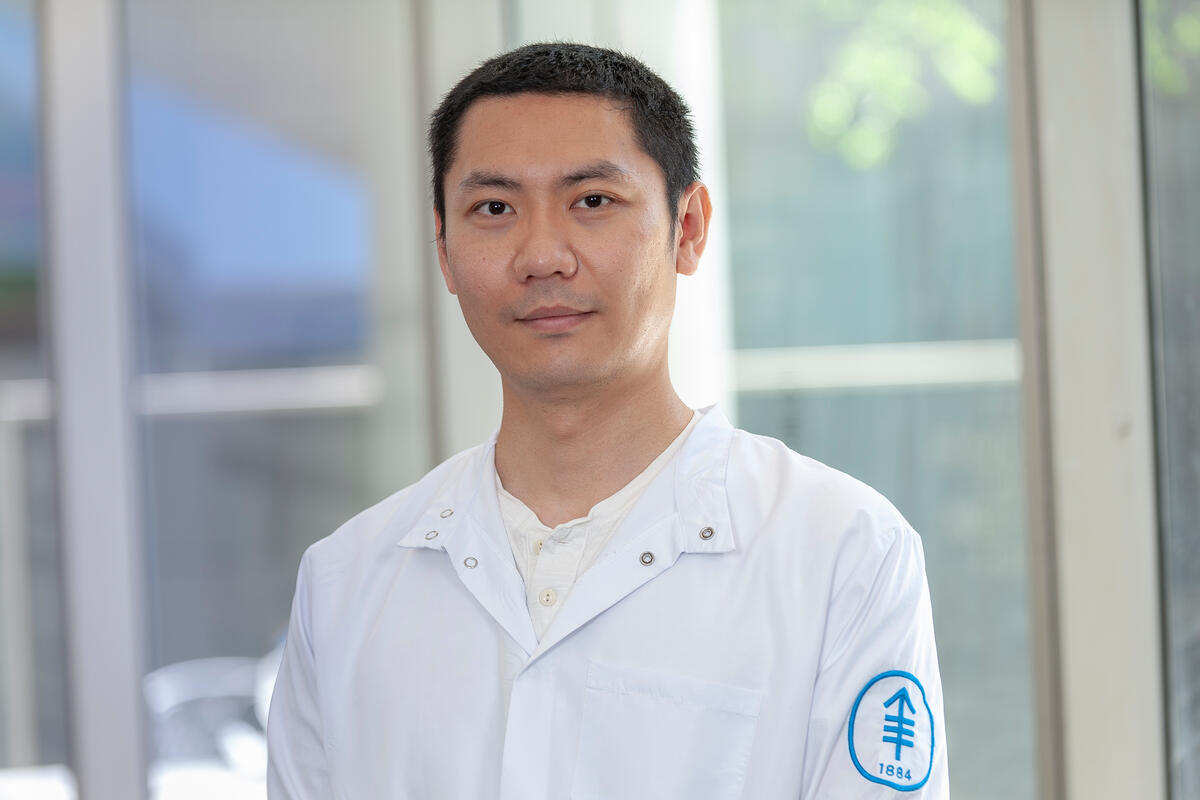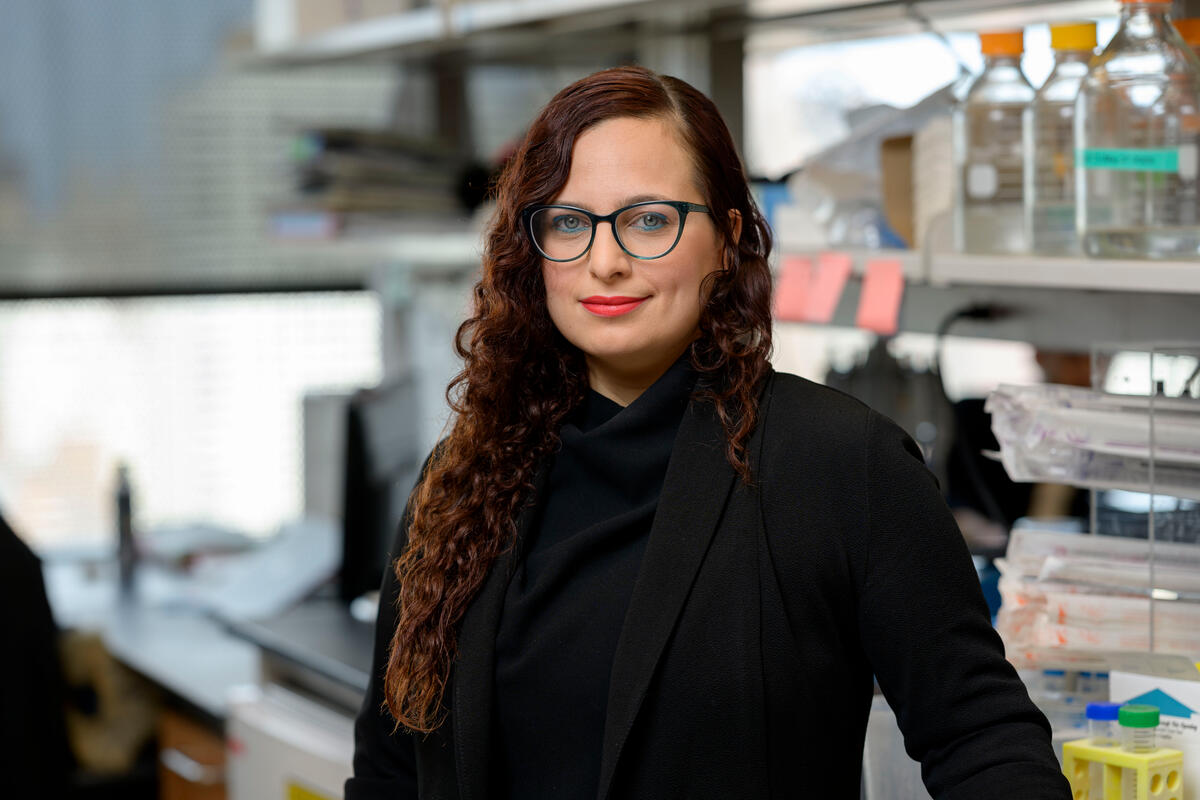
Dozens of MSK doctors and scientists from MSK presented research at the Annual Meeting of the American Association for Cancer Research in San Diego.
Researchers from Memorial Sloan Kettering Cancer Center (MSK) presented new research on a range of important topics at the 2024 Annual Meeting of the American Association for Cancer Research (AACR).
Among the dozens of studies reported were a clinical trial that evaluated a new targeted therapy for brain cancer, animal studies of a potential new immunotherapy for ovarian cancer, a presentation on the role of computational biology in a key area of epigenetics research, and the latest research on the epigenetics of hepatitis B.
A Promising Combination Therapy for Glioblastoma Brain Tumors
Glioblastoma is the most common form of primary brain cancer. The current standard treatment for people with this disease is a type of radiation called intensity-modulated radiation therapy (IMRT) combined with the chemotherapy drug temozolomide (Temodar). These therapies have limited effectiveness.

Dr. Brandon Imber
In a study presented at AACR, a multicenter team of scientists, including investigators from MSK, presented findings from the very first clinical trial to test a new drug called AZD1390 in combination with IMRT. AZD1390 inhibits tumor cells’ repair process and was designed to penetrate the blood-brain barrier, a layer of cells that prevents many cancer drugs from entering the brain. Previous research involving healthy volunteers had confirmed this drug can penetrate the barrier to reach the brain.
The trial, a phase 1 study, included 115 patients who received AZD1390 and IMRT together. The primary goal was met: The drug appeared to be safe, with the most common side effects being fatigue, headache, and nausea. Researchers also found the average length of time that patients with recurrent glioblastoma survived after treatment was 12.7 months. This survival compares favorably with existing standard treatment options for glioblastoma that has returned after initial treatment.
The research was presented by radiation oncologist Jonathan Yang, MD, PhD, who is one of the overall principal investigators of the study and treated many MSK patients on the trial. Dr. Yang is now at the University of Washington in Seattle. Radiation oncologist and early drug development specialist Brandon Imber, MD, MA, is now leading the study at MSK.
Temozolomide works to make glioblastoma cells more susceptible to damage from radiotherapy, but it has limited effectiveness for many patients. AZD1390 is also designed to improve the impact of radiotherapy but uses an entirely different biologic mechanism. “I think this is a promising and novel therapeutic combination for one of the most difficult-to-treat cancers,” Dr. Imber says.
This study was funded by AstraZeneca, the company that makes AZD1390.
New Immunotherapy for Ovarian Cancer Tested in Mice
Researchers from MSK, led by immunologist Michel Sadelain, MD, PhD, were the first to develop chimeric antigen receptor (CAR) T therapies. These treatments involve using a patient’s own immune cells (a type of white blood cell called T cells) to attack cancer. The cells are engineered to recognize a protein found mostly on the surface of cancer cells, allowing them to track down and destroy the cancer while largely sparing healthy cells.

Dr. Zeda Zhang
Research from the labs of Dr. Sadelain and cancer biologist Scott Lowe, PhD, at the Sloan Kettering Institute (SKI), was presented on a new kind of CAR T cell engineered to target a protein called urokinase plasminogen activator receptor (uPAR). This protein is found in high levels in certain kinds of cancer cells, including pancreatic, kidney, bladder, brain, and ovarian cancers. It is also found in senescent cells (cells that have stopped dividing) but not in the cells of vital organs.
In the study, the investigators tested uPAR CAR T cells in a mouse model of high-grade serous ovarian cancer, the most common type of ovarian cancer. They found that the engineered CAR T cells were effective at killing off the cancer cells without causing any severe side effects.
“These results provide a strong rationale for developing uPAR CAR T cells as therapy for a broad range of cancers,” says postdoctoral researcher Zeda Zhang, PhD, the first author of the study. “However, much more research is needed in humanized animal models before we can begin to design clinical trials and test them in patients.”
How Computational Biology Can Advance the Field of Epigenetics Research
Understanding epigenetics, which looks at changes in chromatin states that are not encoded in DNA, is important for developing novel therapeutic strategies for cancer. Drugs that target some aspects of epigenetics already exist, and this field is growing rapidly. A symposium at the AACR meeting focused on the critical role of different epigenetic mechanisms in cancer.

Dr. Christina Leslie
SKI scientist Christina Leslie, PhD, a Member of the Computational and Systems Biology Program, presented her research on machine learning and integrative computational analyses for one aspect of epigenetics: understanding the 3D architecture of the genome and its disruption in cancer cells.
3D genomics assays like Hi-C require high numbers of cells and deep sequencing to directly map 3D genomic contacts. Using a deep learning model, Dr. Leslie showed how 3D genomic folding can be predicted from single-cell chromatin accessibility data, which is more easily generated. In collaboration with physician-scientist Ping Chi, MD, PhD, in the Human Oncology and Pathogenesis Program at MSK, her group also carried out an integrative computational analysis to show how reduced expression of the cohesin loader NIPBL in melanoma leads to global 3D chromatin architecture changes and widespread alternative promoter usage associated with repeat elements in the genome.
“Novel computational methods and integrative analysis can help us to predict, quantify, and interpret these 3D architectural changes and how they relate to changes in cancer,” Dr. Leslie says.
First-in-Class Therapy for Hepatitis B Suggested by Epigenetics Research in Cancer
Disruptions and abnormalities in the regulation of epigenetic processes can contribute to the development of a variety of diseases, including cancer and viral infections.

Dr. Yael David
In a major symposium on epigenetics, Yael David, PhD, a chemical biologist at SKI, presented new work from her lab that applied insights gleaned from studying abnormal chromatin structures (DNA packaging) in cancer to the hepatitis B virus — which affects more than 250 million people worldwide and is responsible for almost half of all cases of hepatocellular carcinoma (liver cancer), the fourth leading cause of cancer mortality, according to the Centers for Disease Control and Prevention.
The researchers investigated the hepatitis B virus’ “minichromosome,” which is formed from viral DNA and human histones, and found that the process of packaging DNA drives the expression of a key gene, HBx, which, in turn, promotes viral infection.
“Elucidating this new mechanism enabled us to halt hepatitis B infection in primary liver cells in the lab by inhibiting histone remodeling, creating a potential first-in-class therapy,” Dr. David says. “Not only do these findings demonstrate the key role of chromatin regulation in disease, but they also show how a deeper understanding of these fundamental processes can open new therapeutic avenues.”